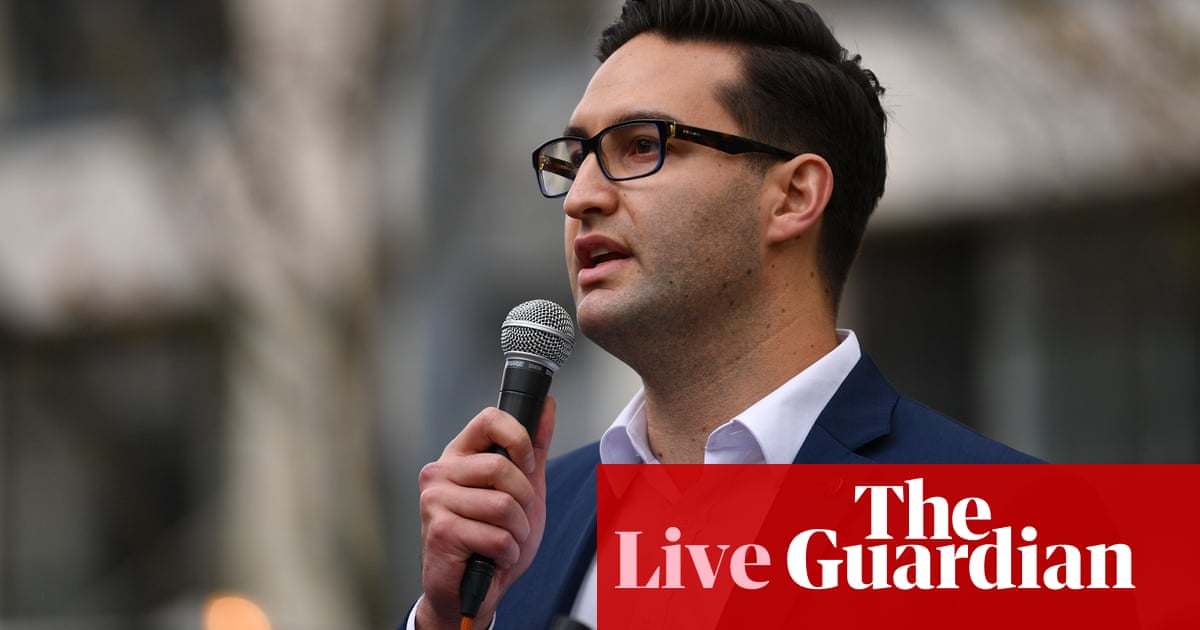Josh Burns says he feels blindsided by Labor gas strategy
Labor MP Josh Burns has said he feels blindsided by the Albanese government’s support for new gas production and that he didn’t get into politics to “be a support mechanism for the fossil fuel industry”.
He was the first of five MPs – including Jerome Laxale, Sally Sitou, Josh Wilson and Ged Kearney – to break ranks and raise concerns about the gas policy.
Speaking on RN Breakfast a little earlier, Burns said:
I’m under no illusion that we have a responsibility to make sure that Australians have electricity, that they have power that they have affordable power. But also what are the levers the government has and how do we use them to ensure that the transition to low-emissions future is happening as quickly as possible? And that is my focus, and that is what I believe the Labor party needs to focus on as well.
Asked if he expects the government to reverse its decision, Burns said “we’ll continue to have conversations about policy direction”. He then pointed out that the number of renewable energy projects had “skyrocketed” under the government.
Burns said one of the problems with the announcement was the “open-endedness”. He argued there needed to be an end date for when Australia will cease using fossil fuels, so there is a timeline to work towards. He later said:
I also have a young family and a young daughter and I want her to know that, in my time in politics, I did everything I could to try and set up Australia and be a part of the generation that takes climate change and the climate emergency extremely seriously.
More on the backbenchers revolting against Albanese’s plan here:
Key events

Daniel Hurst
Analysis continued from previous post:
Penny Wong’s explanation for Australia not locking in its position yet is because the text that will actually be voted on in New York tonight is still being negotiated and updated.
But Wong was careful to distinguish between the UN vote and decisions that countries like Australia might make about bilaterally recognising Palestine as a state. The latter, she said, was not question of if, but “a question of when”.
Highly significant was what Wong said about whether Australia maintained the long-standing bipartisan position that Australia’s recognition of a state of Palestine could only come at the end of a negotiated settlement with Israel. She pointed out that the world was “decades down the track” of pursuing that approach and many countries were now considering doing something different.
The key line: “We should recognise [Palestine] when we think we can make our maximum contribution to progress towards a two-state solution.”

Daniel Hurst
A little earlier, Penny Wong was interviewed about the looming UN vote on admitting Palestine as a full UN member. Let’s take stock of the most significant points from the foreign affairs minister.
Wong didn’t say it explicitly, but it is pretty clear that Australia is teetering between “yes” and “abstain”. It doesn’t appear that an outright “no” vote is in prospect, in light of the government’s stated support for a two-state solution in which Israel and Palestine live in peace and prosperity.
Wong rehearsed arguments that might be made for abstaining: she said this should not be seen as fence-sitting but instead as agreeing in part with a resolution and not standing in the way of it passing. Australia was mindful of the situation on the ground and the “timing”, including that Hamas is still holding hostages.
She also rehearsed arguments for a yes vote: this would simply express the view of the UN general assembly that Palestine should become a member of the UN – a development that can’t occur without UN security council approval, but which the US vetoed when it came up there last month.
Wong rebutted the idea that this would be a reward for terrorism – she said it was “the opposite” because Hamas wasn’t committed to a two-state solution. (International recognition is for the Palestinian Authority, dominated by Fatah, a rival to Hamas.)
Indefinite detention ruling due at 10am

Paul Karp
The high court will deliver its judgment at 10am in the case of ASF17, an appeal that could extend the NZYQ ruling that indefinite detention is unlawful. At stake is whether people in immigration detention must be released if their refusal to cooperate has prevented them being deported.
ASF17 is an Iranian man who has said he “fears for his life if he is removed to Iran” because he is bisexual, Christian, a Faili Kurd and because he had opposed “the mistreatment of women by the government in Iran”.
The court will answer the questions:
-
Is the conduct of an unlawful non-citizen relevant to determining if their detention breaches the constitution?
-
Does it matter if they are deliberately frustrating their removal, are not cooperating, or if the reason is that they have a “genuine subjective fear” if they are removed?
-
Was ASF17’s detention unconstitutional?
In March Guardian Australia revealed a leaked internal estimate that more than 170 could be freed if the commonwealth loses the case, although the government is confident it will win.
The worst outcome for the government would be if the answer to question (1) is no.
If the non-citizens’ behaviour is not relevant, then the government will have to let out everyone who it is not possible to deport, regardless of lack of cooperation.
But it’s easy to see how this result could get messy. For instance, the court could determine that ASF17’s detention was lawful but set down new rules that prompt the government to reassess whether others in detention must be let out.
In November the government was caught somewhat on the hop when the court delivered its judgment on the afternoon of the second day of hearings.
Not so this time. The ASF17 case was heard on 17 April, so the government has had weeks to prepare. Before the hearing Guardian Australia saw detailed plans of how the government would respond in the event of a loss.
These included the fact the government would draft minutes to grant visas to those affected, and protocols for how many are released at a time, to ensure police are on hand to apply electronic monitoring ankle bracelets.
The decision is also likely to spark a political debate about Labor’s deportation bill, which gives the minister powers to require non-citizens to do things to facilitate their own removal.
Former Israel PM says Biden threat could affect ‘certain types of weapons’
Former Israeli prime minister Ehud Olmert was on RN Breakfast a short time ago, and was asked if Israel could manage without US weapons.
The question was in the context of the US president, Joe Biden, threatening his administration will stop supplying bombs and artillery shells if its military pushes ahead with an offensive on Rafah.
Olmert, who was prime minister of Israel from 2006 to 2009, said:
We are very strong country and we can provide a lot of the weapons that we need, we produce them and we even sell them. Perhaps we sell more to other countries than any other country. Certainly any other country in the Middle East or in Europe. But for the long run there are certain types of weapons and munitions which are essential that we may not have enough of.
He said earlier in the interview in relation to Biden’s threat:
What made this great person, the greatest friend of Israel, to say that he will stop the delivery of weapons? I mean, this question has to be proved to the Israeli prime minister to the Israeli government. And they need to give an answer. I’m not happy that the president reached that conclusion. But I can’t ignore the circumstances that brought him into this position.
Foreign affairs minister says there has been antisemitic language at university encampments
Wong was later asked on whether she believes some of the language being used at the pro-Palestine encampments that have spread across Australian universities was antisemitic.
“Yes, I do,” Wong responded. She later added to a question on whether Jewish students are safe on Australian campuses:
Universities have to ensure that they are safe spaces for all students regardless of who they are. Secondly, we do have a right to peaceful protest in this country. And people are entitled to protest in support of their views in a democracy. But in the space that I gave, that are referred to at the beginning of this interview, I spoke not only about Israel and Palestine, I spoke about social cohesion. And one of the things I said is we seem to be losing the capacity in this country to disagree without diminishing the other.
Asked if Wong would support the opposition’s proposed inquiry into antisemitism on campuses, she said:
I think if we’ll look at what they’re proposing, if the objective is to actually try and generate social cohesion, then then I’ll be supportive. But if the objective is to create conflict and division, I think that’s a problem.
Wong says Australia won’t expel Israel’s ambassador over ground invasion of Rafah
Staying on Wong’s interview, Karvelas asked the foreign affairs minister if she supported US president Joe Biden’s decision to pause a shipment of bombs bound for Israel and the statements he’s made on the ground invasion in Rafah.
Wong responded:
I have made very clear statements about Australia’s views about the risk of and deep concern, grave concerns, about a widespread ground invasion in Rafah. I’ve been clear about our objections to an Israeli ground offensive in Rafah. We have [reiterated] this to Israel … The fact that you have an American president making a statement as President Biden has been making is an indication of the extent and depth of the concern.
Asked if the government would follow the Greens’ calls for Israel’s ambassador to be expelled from Australia if Israel goes ahead with a major ground incursion, Wong responded:
No, we are not going to be doing that … We have diplomatic relationships with countries. In many circumstances we may not agree with everything that those countries do, but we believe engagement is important.
Penny Wong under pressure over UN vote on Palestine
Penny Wong is speaking on RN Breakfast now. Right off the bat she was asked by Patricia Karvelas if the Australian government will support admitting Palestine as a full member of the UN at a vote later today.
Wong begins with a preamble about Australia’s support for a two-state solution, then says:
We will consider the final resolution that comes before the General Assembly. Obviously, countries are still negotiating texts.
Q: There have been reports that you’re leaning towards an abstention. If you were to abstain, what would that mean?
Wong responds:
I don’t want to speculate about our vote … I think an abstention generally means you can agree in part with the resolution but not with sufficient, not with all of it, or not with a sufficient extent of the resolution for you to vote for it, so it can send a message that whilst you don’t agree with it in full, you’re not going to stand in the way.
Q: A few of our listeners are texting and saying why wouldn’t you vote yes, given what you’ve said about supporting through the process rather than waiting to the end [for] recognition of Palestine?
Wong responds:
I understand that question … I understand questions from those who don’t want us to deal with it at this time. I think one of the things we are aware of, and thinking about, is the timing of the situation on the ground. We know Hamas is still holding hostages. We want to look at the wording of the resolution to make sure we are being responsible, that what we commit to we are obliged to and look to the UN Charter and the resolution would have to be consistent with the charter. And of course it was with our partners, but your listeners, what I would say to them is Australia does support a two-state solution.
Q: But if you were to vote no or abstain, wouldn’t it be viewed by people who are pushing for a Palestinian state and a two-state solution or a stronger line on Palestine as your reluctance?
Wong responds:
You’ve spoken to me many times over the years, Patricia, and you know I always try and bring a more nuanced discussion about what is really happening rather than getting drawn into the end the hard edges of the debate. Unfortunately, in this country, we seem, we see too much of this discussion, which is looked at by those who basically say you’re either with us or against us. And everything is black and white and simple. Regrettably, that is not what is happening in the Middle East. And regrettably, that is not how we should be looking at this.

Josh Taylor
Meta was correct to remove two Facebook posts allegedly misrepresenting the Australian Electoral Commission’s statements about voting multiple times in the voice to parliament referendum, the company’s independent oversight board has found.
The oversight board, which independently reviews cases selected to examine Meta’s content moderation policy, examined posts by two different Facebook users showing screenshots of information shared by the Australian Electoral Commission (AEC) on X ahead of the voice to parliament referendum in October.
The AEC had posted advice that: “If someone votes at two different polling places within their electorate, and places their formal vote in the ballot box at each polling place, their vote is counted.”
It also posted a comment explaining the secrecy of the ballot would prevent the AEC from knowing which ballot paper belongs to which person, but that the number of double votes is always incredibly low.
The posters both left out other information posted by the AEC, including that voting multiple times is an offence in Australia, and encouraged multiple voting and that people should “smash the voting centres”
Meta removed the posts, and the oversight board found this was the right decision:
The board finds that both posts violated the Coordinating Harms and Promoting Crime rule that prohibits content “advocating, providing instructions for, or demonstrating explicit intent to illegally participate in a voting or census process.
The board’s own analysis found posts containing the AEC screenshot were shared on Facebook over 475 times and received thousands of reactions and at least 30,000 views.
The board reviewed the two posts as part of its preparation for the number of elections in 2024.
Josh Burns says he feels blindsided by Labor gas strategy
Labor MP Josh Burns has said he feels blindsided by the Albanese government’s support for new gas production and that he didn’t get into politics to “be a support mechanism for the fossil fuel industry”.
He was the first of five MPs – including Jerome Laxale, Sally Sitou, Josh Wilson and Ged Kearney – to break ranks and raise concerns about the gas policy.
Speaking on RN Breakfast a little earlier, Burns said:
I’m under no illusion that we have a responsibility to make sure that Australians have electricity, that they have power that they have affordable power. But also what are the levers the government has and how do we use them to ensure that the transition to low-emissions future is happening as quickly as possible? And that is my focus, and that is what I believe the Labor party needs to focus on as well.
Asked if he expects the government to reverse its decision, Burns said “we’ll continue to have conversations about policy direction”. He then pointed out that the number of renewable energy projects had “skyrocketed” under the government.
Burns said one of the problems with the announcement was the “open-endedness”. He argued there needed to be an end date for when Australia will cease using fossil fuels, so there is a timeline to work towards. He later said:
I also have a young family and a young daughter and I want her to know that, in my time in politics, I did everything I could to try and set up Australia and be a part of the generation that takes climate change and the climate emergency extremely seriously.
More on the backbenchers revolting against Albanese’s plan here:
A guide to the Indigenous voice to parliament, written by Thomas Mayo and Kerry O’Brien and published before last year’s ill-fated referendum, won book of the year at the Australian book industry awards last night.
The Voice to Parliament Handbook was hailed “a poignant reminder of a significant moment in Australian history” at the annual award ceremony in Melbourne on Thursday.
Also honoured was Melissa Kang and Yumi Stynes’ Welcome to Sex, a controversial sex education book that was removed from some retailers’ shelves last year after a self-described thinktank claimed “it was teaching sex to children”.
The Voice to Parliament Handbook, published by Hardie Grant in the months leading up to the October referendum, had been “crafted during a pivotal moment in Australia’s political and cultural landscape”, Abias organisers said in a statement, calling it “an extraordinary achievement, developed under intense time constraints”.
Here’s the full story from our arts reporter Kelly Burke:

Jordyn Beazley
Good morning, and happy Friday! I’m Jordyn Beazley and I’ll be with you on the live blog today.
As always, if you see anything you’d like to bring to my attention, please email me at [email protected], or reach me on X at @jordynbeazley.

Cait Kelly
Everybody’s Home wants social housing target increased
Everybody’s Home has urged the federal government to increase its social housing target and back it up with funding in next week’s budget if it is serious about easing the crisis.
Only 3% of homes that the government wants Australia to build over the next five years are set to be social housing.
As the government confronts warnings it will fail to meet its 1.2m housing target, Everybody’s Home spokesperson Maiy Azize said building more social housing was essential:
It’s clear that the private market can’t meet the government’s target, and their track record shows us that these homes won’t be affordable for most people. Social housing is guaranteed to be affordable for people – and, at scale, it pushes down the cost of housing for everyone.
The government describes its national housing target as ambitious but it’s lacking ambition when it comes to bringing down the cost of housing.
There is no use building homes that people can’t afford. The government must end the social housing shortfall – and aim for 10% of all homes in Australia to be social housing.
Long-awaited treatment breakthrough for endometriosis sufferers
The government has announced that from July next year women suffering from persistent pelvic pain and endometriosis will have access to longer specialist gynaecological consultations of 45 minutes or more, covered under Medicare.
The leading standards body for women’s health, the Royal Australian and New Zealand College of Obstetricians and Gynaecologists (Ranzcog), has been lobbying the government to have the benefit added to the Medicare schedule (MBS).
Ranzcog has long argued that current MBS items don’t allow for sufficient appointment time for practitioners to consult with patients presenting with persistent pelvic pain.
Two new items will now be added to the MBS to help patients access improved care for complex gynaecological conditions, requiring an investment of $49.1m. The two new MBS items will provide a higher fee for longer initial gynaecologist consultation ($168.60 for a minimum of 45 minutes, compared to the standard rate of $95.60), and a higher fee for longer subsequent consultations ($84.35 for a minimum of 45 minutes, compared to the standard rate of $48.05).
Dr Marilla Druitt, obstetrician gynaecologist and Ranzcog councillor, said:
The MBS additions are good step in the right direction. Complex problems require complex solutions. If we have more time to listen to patients, we can address their needs better.
There are a number of different areas where we can continue this work, with funding for pain management and endometriosis education for healthcare providers being a priority.
Greens call for Israeli ambassador to be expelled

Daniel Hurst
The Greens have called on the federal government to expel the Israeli ambassador, Amir Maimon, arguing it was time for Labor to move beyond “hand-wringing pleas for restraint”.
Australia has joined with the US and other countries in opposing a large-scale Israeli military offensive in the southern Gaza city of Rafah, raising alarm about the “devastating” impact on Palestinian civilians who are sheltering there.
The Israeli prime minister, Benjamin Netanyahu, has repeatedly said he is determined to proceed with a Rafah offensive, arguing it is necessary to destroy the last stronghold of Hamas in Gaza.
The Greens said the Australian government should expel the ambassador “until the state of Israel abides by the orders of the international court of justice” including allowing the unrestricted flow of aid. The party’s leader, Adam Bandt, said in a statement issued today:
With even Joe Biden suspending weapon shipments, Labor’s continued refusal to take any actions against Benjamin Netanyahu’s extreme war cabinet is inexcusable cowardice.
The foreign affairs minister, Penny Wong, last month played down the idea of expelling Israeli diplomats, saying Australia maintained diplomatic relationships with many countries and used those channels to “express our views about issues which are important to Australians”.
New parliamentary committee set up to investigate social media

Josh Butler
The federal government will set up a new parliamentary committee to investigate social media, including the news media bargaining code, which could force tech giants to pay news publishers for their work.
The communications minister, Michelle Rowland, announced overnight the government’s plan to establish a joint select committee into social media. Her office said it would allow the parliament to examine the influence and impact of social media on Australian society, including its effects on public interest journalism, the spread of online harms and the use of algorithms and recommender systems.
It’s expected to be debated when parliament returns next week.
Rowland said of the social media companies:
Their decisions in recent months – particularly Meta’s decision to withdraw from paying for news in Australia – demonstrates the negative impacts these companies can have on our society.
Social media has a civic responsibility to its Australian users – and our society more broadly. The government is committed to making social media companies more transparent and accountable to the Australian public, and the joint committee will enable parliament to undertake this task.
The committee is expected to examine Meta’s decision to abandon deals under the news media bargaining code, the role of Australian journalism in countering mis- and disinformation on digital platforms, algorithm and recommender systems, effects on mental health and issues such as scams, age-restricted content, child sexual abuse and violent extremist material.
The assistant treasurer, Stephen Jones, raised concerns about “an environment where it can be difficult to distinguish fact from fiction”.
The social media giants seem more determined to wipe trusted news sources from their platforms than scammers and other criminals. This will open the floodgates for misinformation and disinformation.
We have a clear message for the platforms. Be better. Do better. The committee will put big tech under the microscope to help create a safer online environment.
Welcome
Good morning and welcome to our rolling news coverage as we reach the end of another working week. I’m Martin Farrer and these are the top overnight headlines for you to catch up with before my colleague Jordyn Beazley comes along.
The growing number of pro-Palestinian encampments on Australian university campuses has brought with it a much greater level of scrutiny – and accusations of antisemitism from Jewish groups and federal opposition politicians. The protesters say their movement is peaceful but the Australasian Union of Jewish Students claimed this week that Nazi salutes had been seen at the ANU camp in Canberra. Our reporters have spoken to both sides to gauge the mood. It comes as the Greens called last night on the federal government to expel the Israeli ambassador, Amir Maimon, arguing it was time for Labor to move beyond “hand-wringing pleas for restraint”. More details coming up.
Our exclusive lead story hears a bitter complaint from an Aboriginal corporation that its views have been misrepresented in the government’s Future Gas plan to make out that it is in favour of more fossil fuel development. The Nurrdalinji Native Title Aboriginal Corporation is quoted in the document saying energy security is a “pressing issue” but its says its support for more solar has been removed. Also unhappy are five inner-city Labor MPs who have criticised the government’s plan, arguing it will overshadow progress on clean energy.
The government has followed up its tough talk on combating the sometimes harmful impact of social media by setting up a parliamentary probe into their influence and impact on Australian society. The communications minister, Michelle Rowland, will announce today that a new committee will investigate content that people are exposed to online. More coming up.







